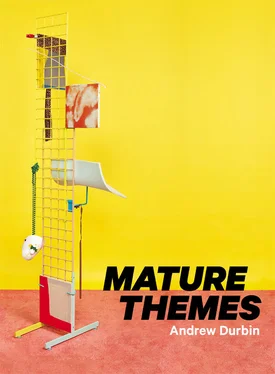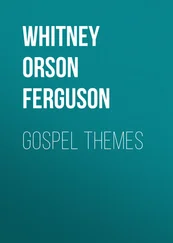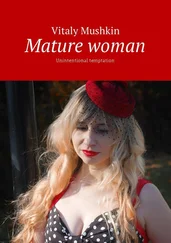Andrew Durbin - Mature Themes
Здесь есть возможность читать онлайн «Andrew Durbin - Mature Themes» весь текст электронной книги совершенно бесплатно (целиком полную версию без сокращений). В некоторых случаях можно слушать аудио, скачать через торрент в формате fb2 и присутствует краткое содержание. Год выпуска: 2014, Издательство: Nightboat Books, Жанр: Современная проза, на английском языке. Описание произведения, (предисловие) а так же отзывы посетителей доступны на портале библиотеки ЛибКат.
- Название:Mature Themes
- Автор:
- Издательство:Nightboat Books
- Жанр:
- Год:2014
- ISBN:нет данных
- Рейтинг книги:4 / 5. Голосов: 1
-
Избранное:Добавить в избранное
- Отзывы:
-
Ваша оценка:
- 80
- 1
- 2
- 3
- 4
- 5
Mature Themes: краткое содержание, описание и аннотация
Предлагаем к чтению аннотацию, описание, краткое содержание или предисловие (зависит от того, что написал сам автор книги «Mature Themes»). Если вы не нашли необходимую информацию о книге — напишите в комментариях, мы постараемся отыскать её.
is a hybrid text of poetry, art criticism, and memoir focused on the subject of disingenuity — and what constitutes "personal experience" both online and IRL when to "go deep" in a culture of so many unreliable communication technologies is to resend a text at 3 AM.
Throughout the book, Durbin’s voice mutates into others in order to uncover the fading specters of meaning buried under the pristine surfaces of art and Hollywood, locating below them the other realities that structure our experience of both.
Mature Themes — читать онлайн бесплатно полную книгу (весь текст) целиком
Ниже представлен текст книги, разбитый по страницам. Система сохранения места последней прочитанной страницы, позволяет с удобством читать онлайн бесплатно книгу «Mature Themes», без необходимости каждый раз заново искать на чём Вы остановились. Поставьте закладку, и сможете в любой момент перейти на страницу, на которой закончили чтение.
Интервал:
Закладка:
“OK, OK,” he said, and stepped back, putting his hands in his pockets.
The driver nodded and got into the car. They drove off.
Katy’s sudden absence felt oceanic. But when I looked at it, at the vacant, shadowy 72nd Street, I saw nothing, neither the other dinner guests nor the car as it began to turn onto Lexington. I saw nothing that would allow me to define “ocean,” as in the biological and ecological contingency that has come to mean “ocean,” let alone “absence.” This, like other things, was OK, even a little nice. Prism is itself an ocean of feeling. Its waves quiver under a moon the shape of Katy’s transformative, prismatic face ebbing in the dark, haloed in blue.
Your ocean is flowing toward me, Katy, I thought, as I stood under the canopy of a palm tree at the empty shore, which wasn’t so much a palm as it was a pun on the fist unballed before a reader who began to trace its creases. He ran his fingers along the groove of my palm, searching the revelatory lines that have crossed one another to locate the coordinates of some future rapidly becoming present.
I asked him what it meant, but he just shook his head.
I looked at him and tried to understand what this might mean, but he didn’t seem to know. He sat at his desk and sighed, looked at his computer screen, and transferred information he located in several databases into a few Excel spreadsheets open on his desktop in preparation for an extended memo due at the end of the week. His chair squeaked and he wrote a Post-it note to remind himself to tell head of operations that he needs a new chair. He occasionally looked at the clock near his outgoing mailbox. As always, he felt “stretched thin.”
He often wondered if his coworkers were as bored as he always was. He doesn’t have an office window to look out of but he frequently likes to pause in his day to imagine what is outside the building: the parking lot, the road that leads out of Virginia and back to D.C. He finds this life theoretically beautiful though in practice he could see himself doing other work. That other work remains unknown in its details to him but he thinks about what it could be fairly often. It would be something practical but beautiful.
Whenever the song “Dark Horse” plays on his iPod shuffle, the reader thinks about suggesting that title as a name for a program the office — or rather, the complex of agencies collated into what he refers to as “the office”—is developing. The song, like the other songs on the album, reminds the reader of a time he had dinner with a high school girlfriend’s parents, the night of a significant local football game. Her father was an intolerant man who, after 9/11, found a vital resource for his hatred in the internet. Her father peddled in conspiracies related to the complicity of the Bush Administration in designing and executing the attacks, which he cryptically referred to as “the Opening.” He would often begin sentences: “Before the Opening” or “After the Opening.” The Opening, as he described it to the reader, was the event that both admitted the veracity of the lie and the falsity of the truth simultaneously; that is, the Opening articulated two points about reality, holographic in its lush, simulated surfaces: one, that the perceivable conditions of life in the United States were lies that covered up the generators of those conditions and, two, the lies pre empted what created them and so remain the primary “reality” (and not, as shadier conspiracies might have it, the reverse). He liked to say that facts were useless things. What matters is the dream that gives those facts a purpose, a life.
After that dinner, the Opening became a frequent reference point for the reader as he left his hometown, attended Georgetown, and began to work in the DC metropolitan area. He often thought about its merits and debated it with himself privately. Soon the reader began to feel the Opening everywhere, at every instance, whether he was at work or at the gym or having a drink or listening to Prism , which he gradually discovered (as he discovered with many, many things) was based on this exact twinned point. Perry puts it more simply, the reader thinks, in arguing that the fantasy that renders the present experiential does not conceal a “deeper,” more “true” reality. Rather, it is fantasy that allows reality to spread.
He leaned back in his chair. It squeaked under his weight.
“Dark Horse” evokes the early Sunday hours at the height of the American weekend, the last minutes before sunrise, when you either choose among the dazed remnants of the night or go home alone. Also, the highly organized systems of information management that cache, tag, and categorize both the metadata of these remnants (text message: “hi what r u doing rite now its late i know”; recorded as “Message containing no flagged content sent at 3:02:42AM 11/08/13 from Maison O, 98 Kenmare Street, New York, New York 10012) and the remnants themselves (recorded as: ANDREW SCOTT DURBIN, resident of 855 Park Place, Brooklyn, New York 11216; born 09/28/89; profile clear of flagged content. SEE MORE). The cover of Perry’s Prism features a photograph of the artist taken by Ryan McGinley, whose terrible work effaces the marks of aging and those that differentiate youthful bodies by reducing them to a blur, blotched in the sunlit fields or the caves out west, flakes of flesh tones in which only the vaguest outline of a thin college student emerges, naked, unseduced by the camera itself but in love with the audience at the other end of the process that manufactures his image. People stare at them in the gallery or scrolling through a blog on their iPhone, the faces staring back, sometimes very clear, sometimes still blurrier, prismatic, triangulated as viewer, model, and the networks of distribution for which Ryan McGinley serves as a conduit for an idea of beauty not exactly universal as it strives toward a uniqueness defined by the unexpected intensity of the sight of someone’s sharp pelvis or high cheekbones but getting there. They are strange, even ugly in McGinley’s photographs, and yet this doesn’t deprive them of their magnetism. The three of us — model, Ryan, and I — begin to organize into a record of taste to be graphed by agencies more or less invisible to us. I text my friend “hi what r u doing rite now its late i know” and even though I am certain no response will come I go deep and send it again. The impulse is, itself, based on a belief in the dark horse: that a thing probably won’t happen leads me to think that it must. In [REDACTED]’s apartment, everything darkened as we resumed our places at the table. In the candlelight, I stared at the cover of Katy’s new album, narrowing in on the little A in Katy shaped like a triangle, a prism, over Ryan McGinley’s sun-drenched image of her as she catches the light, and it became easy to see in it another prism, lying in repose among the sunflowers, the quartz pyramid through which light becomes a rainbow or in other iterations, rectangular or cubic or pentagonal or, finally, the hexagonal crystal, in which I see myself telling Katy to back up a step, please, Katy, can someone get her some makeup please? and raise the silvery cloth up to your lips before the green screen where my assistants later overlay the field that seems real but probably isn’t, or back of that, another prism that spins in a nest of light, tagging content endlessly, storing that content into the plural databases where I take residence among the machines who read me, who render me legible in various other systems languages, flagging “bomb,” for example, like, Katy Perry is the bomb, Katy, you’re the bomb, as the prism spins in my hand and I bring it close to speak into it, pressing it to my lips, under a prismatic sunset a gradient of red like the stroked, reddish brown hair of a horse moving across a field, the field where the sunflowers do not wilt under the hand of Ryan McGinley’s assistants, the horse moving quickly through it, running up and turning back at the electrified fence over and over again in a game it plays with the only environment it knows. I raise my phone to take a picture. I hold it close, tap the screen to focus the image, but the horse moves too quickly and I only manage to snap a photo of a blur. I post it to Instagram anyway, marking for friends and the servers mainlined to the various agencies that might take note that, somewhere, I saw a horse, and that that horse was moving fast.
Читать дальшеИнтервал:
Закладка:
Похожие книги на «Mature Themes»
Представляем Вашему вниманию похожие книги на «Mature Themes» списком для выбора. Мы отобрали схожую по названию и смыслу литературу в надежде предоставить читателям больше вариантов отыскать новые, интересные, ещё непрочитанные произведения.
Обсуждение, отзывы о книге «Mature Themes» и просто собственные мнения читателей. Оставьте ваши комментарии, напишите, что Вы думаете о произведении, его смысле или главных героях. Укажите что конкретно понравилось, а что нет, и почему Вы так считаете.











